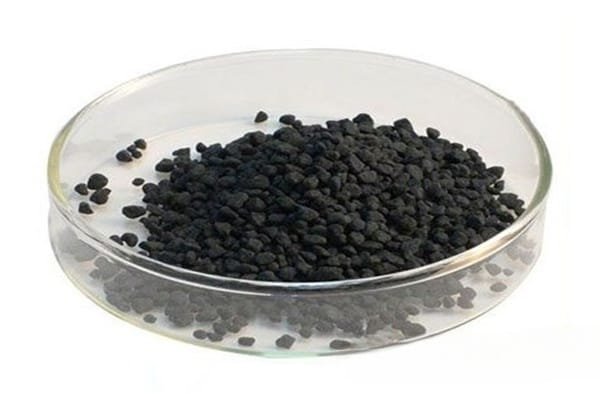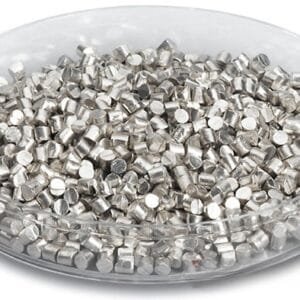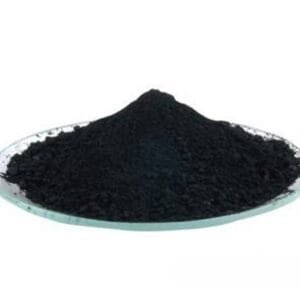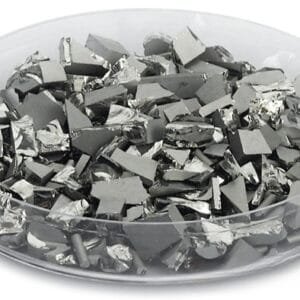Molybdenum Carbide Evaporation Materials
Introduction
Molybdenum Carbide (Mo₂C) evaporation materials are widely used in thin film deposition processes for their exceptional hardness, high melting point, and excellent chemical stability. As a compound material combining molybdenum and carbon, Mo₂C offers a unique combination of metallic and ceramic properties, making it highly valuable in fields that demand wear resistance, thermal stability, and high conductivity.
Detailed Description
Molybdenum Carbide evaporation materials are typically produced through high-temperature synthesis or chemical vapor deposition (CVD), ensuring homogeneity and fine crystalline structure. They possess a melting point around 2,687°C, offering outstanding performance in high-vacuum and high-temperature environments.
Key physical properties include:
High hardness and strength: The material’s carbide structure provides superior resistance to mechanical wear and erosion.
Excellent electrical and thermal conductivity: Enables uniform film formation and efficient energy transfer during evaporation.
Good chemical stability: Resistant to oxidation and corrosion at moderate temperatures, extending its lifespan in demanding environments.
Low vapor pressure: Ensures smooth and stable evaporation, preventing contamination during thin film formation.
The material is available in multiple forms such as pellets, granules, pieces, or rods, suitable for both electron-beam and thermal evaporation systems. Custom dimensions and purities (up to 99.9%) can be tailored for different equipment and coating requirements.
Applications
Molybdenum Carbide evaporation materials are used across a wide range of industries and research fields, including:
Hard and protective coatings for cutting tools and wear-resistant components
Semiconductor and microelectronics thin films
Decorative coatings requiring metallic luster and durability
Optical coatings and anti-reflective layers
Catalytic materials for hydrogen evolution reactions and chemical processing
Aerospace and energy systems for high-temperature and high-stress applications
Technical Parameters
| Parameter | Typical Value / Range | Importance |
|---|---|---|
| Chemical Formula | Mo₂C | Defines the stoichiometric composition |
| Purity | 99.5% – 99.9% | Higher purity improves film uniformity |
| Melting Point | 2,687 °C | Enables high-temperature stability |
| Density | 9.18 g/cm³ | Affects deposition rate and uniformity |
| Evaporation Source | E-beam or thermal boat | Determines evaporation method |
| Particle Size | 3 – 6 mm (custom) | Suitable for crucible loading and even evaporation |
Comparison with Related Materials
| Material | Key Advantage | Typical Application |
|---|---|---|
| Molybdenum Carbide (Mo₂C) | High hardness, wear resistance | Protective & electronic coatings |
| Molybdenum (Mo) | High purity, excellent conductivity | Semiconductor & optical coatings |
| Tungsten Carbide (WC) | Higher density, extreme wear resistance | Industrial & decorative coatings |
FAQ
| Question | Answer |
|---|---|
| Can Molybdenum Carbide evaporation materials be customized? | Yes. We can supply in pellet, granule, or custom-shaped pieces according to your system design. |
| What evaporation methods are compatible? | Suitable for both electron-beam and resistive thermal evaporation systems. |
| Is Mo₂C suitable for reactive deposition? | Yes. It can be used in reactive atmospheres such as nitrogen or oxygen depending on the desired compound film. |
| What is the packaging method? | Vacuum-sealed in moisture-proof containers with protective foam to prevent oxidation and contamination. |
| Which industries most commonly use it? | Semiconductor, optical, aerospace, and energy sectors. |
Packaging
Our Molybdenum Carbide Evaporation Materials are carefully sealed in vacuum-packed containers with anti-static and anti-corrosive protection. Each batch is clearly labeled with material name, lot number, purity, and weight for full traceability. We ensure safe international shipping with export-compliant packaging.
Conclusion
Molybdenum Carbide evaporation materials combine the durability of ceramics with the conductivity of metals, providing stable and high-quality thin film performance for advanced coating technologies. With customizable sizes and purities, these materials are an excellent choice for demanding deposition applications.
For detailed specifications or quotations, please contact us at [sales@thinfilmmaterials.com].


 MSDS File
MSDS File



Reviews
There are no reviews yet.